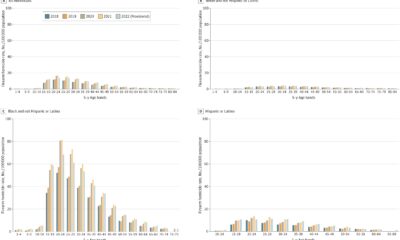World News
Colorado’s youth detention centers need better supervision, the Ombudsman says

Colorado’s juvenile detention centers lack key surveillance tools to determine whether staff are appropriately applying physical restraints to teens in their care, according to a new report released Tuesday.
An issue overview of the Office of the Colorado Child Protection Ombudsman advises the state Department of Youth Care add audio recordings, in addition to the existing video, to fully evaluate encounters between staff and youth. Currently, state detention centers only record images without sound.
“Young people living in Colorado’s DYS youth centers deserve to be kept safe,” the report said. “If they have concerns about their safety or the way they are being treated, they have the right to have those complaints dealt with by an independent body.”
The ombudsman’s office reported several instances where employees injured teenagers while physically restraining them. In written reports following the incident, staff said the youths made verbal threats or disobeyed orders.
But without audio, reviewers couldn’t independently judge whether the restraint was justified, the brief notes said.
“Until we fully understand what’s happening on the ground, we can’t possibly diagnose the problem — let alone the solution,” Stephanie Villafuerte, the state’s child protection ombudsman, said in an interview.
Teens told the office they support improving surveillance systems at youth centers and said they believe staff know the cameras’ blind spots. Youth also said staff use the lack of audio to make threats or intimidate them – actions that cannot be proven after the fact.
Between March 2023 and August 2023, 465 different teens experienced a restraint technique approximately 4,614 times, according to state data in the letter. Black youth represented 38% of restrictions but only 23% of the centers’ population, a trend the report’s authors called “troubling.”
The Ombudsman’s Office received 47 reports of excessive force and staff misconduct this year – a 27% increase from last year.
The Department of Youth Services has resisted implementing these changes, the report said. State officials say requiring staff to wear body-worn cameras — as is required in several other states — “does not align with the DYS trauma-informed approach they are trying to enforce.”
The second reason: cost, even as the state has made other upgrades to facilities in Colorado.
The ombudsman made several recommendations, including upgrading surveillance systems with audio and video and providing additional data on the number of restrictions deemed justified and unjustified. The report also called for the state to count the number of times a juvenile suffers serious physical harm during a restraint order.
“This solution is very simple,” Villafuerte said. “This problem is solvable.”
Sign up to receive crime news straight to your inbox every day.
Originally published:













